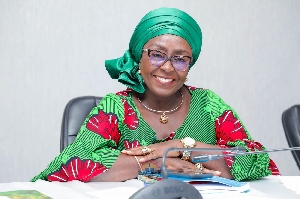Some GHS28 million of the Electoral Commission’s estimated GHS 390,265,186.44 budget for the compilation of a new register of voters ahead of the 2020 polls, would be used to pay per diems of EC officials, General Secretary of the opposition National Democratic Congress (NDC), Mr Johnson Asiedu Nketia, has said.
The total amount approved for the EC’s activities this year is GHS1.3 billion – GHS500 million less than the GHS1.8 billion budgeted for the Commission in 2016 for the conduct of that year’s elections.
Out of the 390 million voter registration budget, over GHS161 million is expected to be spent on allowances of registration officials while the procurement of materials is expected to cost over GHS 156 million.
In a recent press statement issued by the EC to justify the need for a new register, the Commission said: “It has been alleged that the EC is wasting public resources to compile new voters register. This accusation is also far from the truth. In 2012, the new voters register cost the Commission GHS 169,730,146.00. The 2014/2015 Limited Registration Exercise cost GHS 287,559.379. In 2016, the Limited Registration Exercise cost GHS 487,998,714.00; it is important to note that the compilation of a new voter register in 2020 is estimated to cost GHS 390,265,186.44. Note that we are referring to a new register here. The expenses stated above relate to cost of hiring registration officials and procurement of consumable registration materials. It’s worth mentioning that the current administration of the Commission is committed to judicious use of state resources for electoral activities”.
However, Mr Asiedu Nketia told UTV’s ‘Mpu Ne Mpu’ programme hosted by Yaa Konama that the Commission would spend close to GHS1 billion on the registration exercise out of which GHS28 million would be used to pay per diems.
Adducing reasons to buttress the NDC’s opposition to the EC’s planned compilation of a new register in May this year, Mr Asideu Nketia said: “A new register has the potential to affect the credibility of the election because the EC itself has admitted that the current register is credible; so, if there is a credible register and you insist on replacing a credible register, what are you doing it for?”
The EC, Mr Nketia noted, has said it publicly in Parliament, at Inter-Party Advisory Committee (IPAC) meetings, and to the hearing of all Ghanaians after the recently-held district assembly election that the current register is a credible one, and, so, wondered why the EC, in his view, was rushing to compile a new one.
“Every election management person knows that assembly elections are the most difficult to manage because of the number of candidates. The assembly polls generated about 7,000 Assemblymen and women and 33,000 Unit Committee members.
“So, you’ve been able to use the current register to fill 40,000 vacancies while the Biometric Verification Devices (BVDs) you described as ‘obsolete’ were 99 per cent efficient during the conduct of the same election – a rating confirmed by CODEO – so, if you [EC] are saying that the machines you declared ‘obsolete’ performed with 99 per cent efficiency and filled 40,000 vacancies, then what changed within two weeks that the same register and machines can’t be used to elect a President and 275 MPs? We don’t understand”, he said.
“Aside from that, we are wondering why the almost GHS1 billion to be used for the compilation of a new register can’t be used to solve many problems confronting Ghanaians”, Mr Asiedu Nketia pointed out.
General News of Saturday, 11 January 2020
Source: classfmonline.com

















